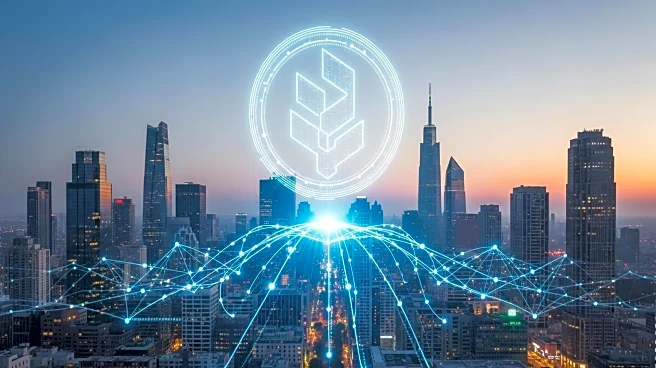What's Happening?
The U.S. economy experienced a significant rebound in the second quarter of 2025, with a 3.3% annual GDP growth following a contraction in the first quarter. This growth was primarily fueled by consumer spending in sectors such as healthcare, food services, and motor vehicles. However, a transformative force contributing to this economic expansion is blockchain technology. Blockchain is enhancing transparency, efficiency, and trust in economic systems, indirectly supporting consumer access to goods and services through improved supply chain operations. Additionally, blockchain-enabled digital wallets and mobile banking platforms are expanding financial inclusion, fostering a more responsive consumer market. The U.S. Department of Commerce plans to leverage blockchain for real-time GDP data reporting, aiming to modernize economic reporting and improve accuracy.
Why It's Important?
Blockchain's role in the U.S. economy is becoming increasingly significant, not only by supporting traditional economic drivers but also by directly contributing to GDP growth through sector-specific innovations. In fintech, blockchain is revolutionizing cross-border payments, reducing transaction costs, and enabling faster settlements, which boosts international trade. The tokenization of assets is projected to encompass 10% of global GDP by 2027, unlocking new liquidity pools in real estate and infrastructure. The U.S. blockchain market is expected to grow significantly, driven by demand for secure transactions, smart contracts, and decentralized finance. This presents a dual opportunity for investors: direct benefits for fintech firms and indirect gains from a more efficient economy.
What's Next?
The U.S. government's initiatives to integrate blockchain into economic reporting indicate a path toward broader adoption. However, challenges such as regulatory uncertainties and data accuracy concerns must be addressed to fully realize blockchain's potential. As blockchain technology continues to reshape traditional financial intermediation, stakeholders in fintech, cybersecurity, and blockchain infrastructure development stand to benefit. The convergence of blockchain and macroeconomic growth suggests that blockchain is becoming a foundational force in the global economy.
Beyond the Headlines
Blockchain's integration into economic systems could lead to long-term shifts in how financial transactions are conducted, potentially reducing reliance on traditional banking systems. The technology's ability to enhance transparency and reduce friction in economic models may also influence public policy and regulatory frameworks. As blockchain becomes more embedded in economic processes, ethical considerations regarding data privacy and security will need to be addressed.










